
Can I Tow With 4 Wheel Drive Engaged and Should I Tow In 4H or 4L
Updated 01/09/2026 | Published 01/16/2020
Question:
I read everywhere that you should never tow in 4WDinch but no one ever explains why? What would be the issue of towing in 4H? If its acceptable to tow in 4WD when the surface requires it mud, snow, etc, then why no on dry pavement? As modern 4H allows the front and rear axles to spin at different rates, what would be the issue? And what if your towing vehicle is full time 4WD? Im assuming you guys would be a authority on this. Thanks
asked by: Mark
Expert Reply:
I'll start this off by saying that towing in 4WD and driving dry pavement with 4WD engaged are two completely separate issues. Towing in 4WD has more to do with performance and safety, where driving with 4WD engaged on dry pavement is more of an issue that will potentially damage your vehicle.
The reason that it is advised against towing with 4WD engaged is that since the rear axle will be receiving the majority of the weight/contact when towing a trailer, you will want the power to come from the rear (not divided between the front and rear axle). For normal towing you should always use 2-wheel drive. The exceptions to this are extreme conditions such as snow covered or muddy roads that would normally require 4 wheel drive, and in most cases you'll want to tow in 4L because of the added horsepower you get with the lower gearing; it will also save your brakes since the engine and transmission will help slow the vehicle down. You're not gaining anything by trying to tow in 4WD over 2WD.
When it comes to driving/towing with your 4WD engaged on dry roads, the reason that this is not advised is comes down to the potential for damaging your vehicle. Part time 4WD is designed to be engaged only when wheel slippage is possible. Since part time 4WD vehicles only have a single differential, power is distributed equally to both axles. When on wet pavement, snow, mud, etc., the natural slippage on the wheels limits the stress on your drive-train components (transmission, transfer case, U-joints, bearings, etc.) and because the wheels can still move there isn't any binding; when the wheels can't slip, binding occurs and creates unnecessary stress that can cause components to break or weaken. When driving on dry pavement, there is no slippage, which creates immediate stress on these components. Taking aside the potential damage to your vehicle, it goes back to the principles mentioned at the outset of this answer where you want the weight of the trailer to be closest to drive axle. It should also be noted that just because most part time 4WD axles can deal with small differences in spin (normally encountered when turning), any moderate to significant difference will cause binding-which is where you run the risk of damaging components.
You can tow with an AWD vehicle without issue, but an all-wheel drive isn’t equivalent to one with four-wheel drive. You can’t take it on the same tracks or expect the same performance, simply because it doesn’t have the same ground clearance (in most instances) or lower gear range(4L) that is available on vehicles with part time 4WD and a transfer case. Most AWD vehicles have 3 differentials (2 in vehicles that are "automatic" AWD) to account for both axles receiving power and they can handle the variability of the axles spinning at different rates without damaging the drive-train components. Part time 4WD vehicles can handle small differences in the rates that the axles might spin, which really only occurs when turning, but they rely on some slippage to lessen the stress on the drive train components.
Long story short, it's really down to added stress on the vehicle's components and the poor performance. There is no added benefit to towing in 4WD when it's not needed, and when it is needed it should be used sparingly or in 4L. Your best guide for things like these are almost always the owner's manual, which will give you the best advice on when 4WD should be used on your particular vehicle.
I've also linked some of our help articles on towing, including some information on snow chains (which are recommended for trailers in conditions that you'd need 4WD) to help with off-road towing that you might find helpful to have a look at.

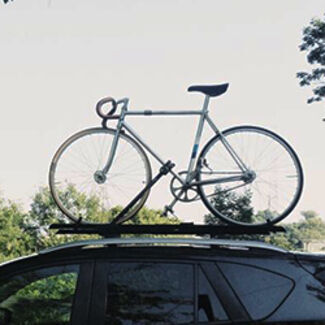
S R.
1/9/2026
Hello Erik, I'm in the market for a truck to tow a small boat. Looking at options between 4x4 and RWD. I live somewhere completely flat, my only concern is pulling the boat up on slippery boat ramps. I think with good tires though RWD would suffice, or would you recommend 4x4? Thanks!

Featured Help Information
Miscellaneous Media

Continue Researching
- Shop: Suspension Enhancement
- Shop: Tire Chains
- Search Results: fastway e2 shank
- Shop: Titan Chain Snow Tire Chains - Diamond Pattern - Square Link - Assisted Tensioning - 1 Pair
- Shop: Towing Mirrors
- Article: Snow Tire Chain Overview: How to Buy the Right Tire Chains
- Shop: Glacier Cable Tire Chains - Ladder Pattern - Roller Links - Manual Tensioning - 1 Pair
- Search Results: shank
- Search Results: weight distribution hitch
- Search Results: accessories and parts
- Search Results: 5 on 55 wheel
- Search Results: weight
- Search Results: spare tire
- Q&A: Will Curt Weight Distribution Shank Work with Fastway E2 Weight Distribution System FA92-02-4100
- Video: Feature Breakdown: Fastway e2 Weight Distribution Shank
- Video: All About the BulletProof Hitches Kinetic Recovery Rope
- Shop: Curved Equalizer for 1-3/4" Wide Double-Eye Springs - 5-3/4" Long - 9/16" Center Hole
- Shop: Loadstar ST215/75D14 Bias Trailer Tire with 14" White Wheel - 5 on 4-1/2 - Load Range C
- Shop: Replacement Pintle Conversion Kit for 2" Weigh Safe Pintle Hitches
- Shop: Blue Ox SwayPro Weight Distribution w/ Sway Control for 2-1/2" Hitch - 20K GTW, 2K TW
- Q&A: Recommended Weight Distribution System for 1,175 lb Dry Tongue Weight Trailer
- Q&A: Highest Capacity Weight Distribution System
- Shop: Fastway e2 Weight Distribution Shank - 12" Long - 6-1/2" Rise, 4" Drop - 1,200 lbs TW
- Q&A: How To Achieve 8' Width On Mount-n-Lock GennyGo
- Video: Review of RV Air Replacement Coleman-Mach ChillGrille Air Filters - RA78QV
- Shop: Fifth Wheel Hitch
- Shop: Gooseneck Hitch
- Video: Best 2024 Ford F-150 Tire Chain Options
- Video: All You Need to Know About the Titan Chain Cable Tire Chain
- Video: Breaking Down the Blue Ox SwayPro Weight Distribution w/ Sway Control for 2-1/2" Hitch





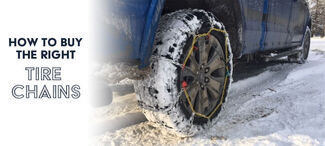
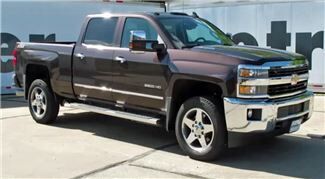













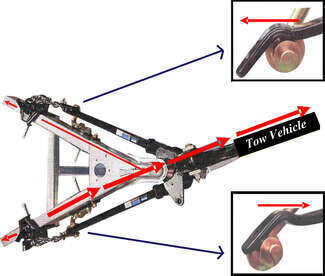
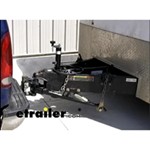

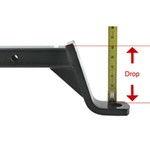


Loren J.
7/2/2025
I have a 2024 colorado Z71 and I tow a camper with it. When selecting Tow Mode a notice on the DIC says to shift to 4Hi. GM is in conflict with you. Would they have a reason, valid reason or just mony/ repair motive.